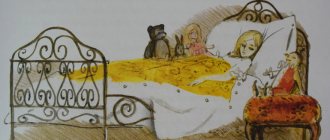- Summary
- Ekimov
- Night of Healing
Grandson Grisha came to visit Grandma Dunya in the village to go skiing and fishing. He grew up and came to visit his grandmother on almost every holiday. Dunya's children have long grown up and gone to live in the city. Therefore, the old lady was only happy to prepare a delicious lunch and dinner, bake her grandson’s favorite pies and quietly wait for Grisha, looking out the window. In her old age, Grandma Dunya began to talk and scream in her sleep, so when she came to visit her son and daughter, she tried not to stay overnight, so as not to frighten her relatives or cause them concern.
After dinner, the old woman told her grandson Grisha not to be scared when she screams in her sleep and says that this is old age. At night, Grisha heard his grandmother’s screams in a dream that she had lost her bread cards and that the acorns she had collected to feed her children were being taken away from her. At first Grisha was very scared, then he went into Baba Dunya’s room and woke her up.
In the morning Grisha and his friends went skiing to the Don to fish. I promised my grandmother to bring a lot of fish so that she could cook fish soup. By evening he was so tired that at night he no longer heard Dunya’s screams. A day later, Grisha went to the post office to call his mother. He told her about his grandmother’s screams at night. At this moment, my mother advised me to loudly shout the word “silence” to my grandmother and she should fall asleep. Returning back, Grisha began to think about how to help his grandmother. He did not want to cruelly, in his opinion, shout to his grandmother to “be silent.”
That night he did not go to bed, but waited for his grandmother to start screaming in her sleep. The old woman started muttering again that she had lost her food cards. Grisha knelt down next to the bed and began to say that everything was fine, the cards had been found. He repeated for a long time: “Grandma, take your cards that you lost in the blue handkerchief. I found them." “Take the cards and sleep peacefully, sleep,” Grisha said, calming his grandmother. She fell asleep.
After some time, Baba Dunya again began screaming in her sleep and asking to spend the night. The grandmother shouted that she had a document and was going to see her husband in the hospital. This time Grisha was also reassured by his grandmother, and she calmly fell asleep until the morning.
When Grisha went to bed, he thought that tomorrow he would tell Baba Dunya how he calmed her down at night. Then suddenly I clearly understood that I couldn’t speak. You need to do this every night, but remain silent, then the old woman will be healed.
The story teaches you to be kinder, more cordial to your family and friends, and then they will live happily ever after.
You can use this text for a reader's diary
About the product
The story “Night of Healing” by Ekimov was written in 1986. In his work, the author raises the problems faced by people who survived the hard times of war. This is a story about mercy, sincere love for others.
At the center of the story is Baba Dunya, who survived hunger during the war, and her grandson, who came to visit her on vacation. The work teaches us to be sensitive and attentive towards loved ones, to provide help without talking about it.
To better prepare for a literature lesson, we recommend reading an online summary of “Night of Healing” on our website.
The material was prepared jointly with a teacher of the highest category, Ilyina Galina Sergeevna.
Experience as a teacher of Russian language and literature - 36 years.
The meaning of the story “Night of Healing” by B. P. Ekimov
Stories are written for entertainment.
For the sake of a short escape from reality and immersion in other worlds. To spy on someone else's life and not feel guilty, because this life never existed. Sigh and be glad that things are better for you. Or admire the fictional happiness and perk up. But some stories are not a fun literary attraction - a frank conversation that touches the feelings, as a loved one can do, and not a cute fantasy. In such cases, the writer transfers reality to paper - events that he once witnessed, people he once knew. He talks about his fears, about his vision of good and evil and does not hide his gaze, waiting for a reaction.
B. P. Ekimov’s story “Night of Healing” is a vivid example of emotional dialogue between the author and the reader.
Summary
A grandson came to visit his grandmother for the winter holidays, and he immediately ran off “to go skiing with the guys.” With his arrival, Baba Dunya instantly came to life and began preparing various delicacies that Grisha loved so much. The boy came to dinner, ate a hearty meal and immediately ran off with his friends to skate. Although he was not around, Baba Dunya no longer felt loneliness - the things of her beloved grandson lay everywhere, and “there was a living spirit in the house.”
Baba Dunya had a son and daughter who settled in the city. They rarely visited their mother, and she did not come to them more often. On the one hand, the woman was afraid to leave the household unattended for a long time, and on the other hand, she did not want anyone close to her to find out about her problem. Recently, Baba Dunya began to sleep restlessly, “talking and even screaming in her sleep.” In her hut, no one would hear anything, but when she was visiting, she didn’t let anyone sleep at night with her screams. The relatives understood “that old age and the unsweet life that Baba Dunya led were to blame,” but this did not solve the problem.
Baba Dunya was taken to doctors, she took medications, but nothing helped her. So Baba Dunya began to “visit the children less and less,” and then she would come for a few hours, talk, and then immediately return to her home. The children came to her even less often, only in the summer, and only her grandson Grisha, as he grew older, came to his grandmother for the holidays. He had a lot of fun in the village: fishing with local children, picking mushrooms, and skiing and skating in winter. Baba Dunya, looking at her playful grandson, was very happy, forgetting about her illnesses.
In the evening Grisha returned from his walk and began preparing fishing gear for tomorrow's fishing. Baba Dunya warned him that he might make “noise” at night and asked him to wake him up. Grisha woke up from the scream of his grandmother, who was desperately trying to find a blue scarf in which bread cards were tied - without them, her three children could die of hunger.
Crying, the grandmother told Grisha what hardships she and the children had to endure during the war. Even after so many years, the poor woman could not forget that horror. Grisha suddenly clearly understood how “weak and lonely” Baba Dunya was. The boy began to think about how to help her. Having waited for his grandmother's screams at night, Grisha began to calm her down, assuring her that the scarf had been found, the cards were intact and the children would be fed. Grandmother believed him in a dream and calmed down.
Grisha sat next to his grandmother all night. At first he wanted to tell her everything in the morning, but then he realized that under no circumstances should he do this - “You need to do it and be silent. And healing will come."
The meaning of the story
B.P. Ekimov shows how severe the injuries are caused by war and constant deprivation. The wounds are covered with thin skin and seem to have healed, but inside they continue to bleed and fester. Decades pass, and at the most unexpected moment the skin breaks, suffering bursts out. What happened a long time ago makes it difficult to live in the present moment.
The worst thing is that for others, an open wound looks stupid and an annoying hindrance - they try to reduce the consequences, but do not think about treatment. For them, terrible visions from the past are something ephemeral that happened so many years ago that it has almost ceased to be true. Horror story. And for some reason, the closest people forget that help is not limited to a pitiful face, but is expressed in actions.
What is the meaning of the ending?
The ending of the story “Night of Healing” celebrates the victory of compassion over indifference. Don’t turn away, don’t pretend to be blind—extend your hand to the suffering. They woke Baba Dunya up so that she wouldn’t disturb her sleep, or they shouted at her, ordering her to be silent, or they dropped her valerian, but no one wondered why. Why is she screaming? What does it need?
Story test
Check your memorization of the summary content with the test:
- /10
Question 1 of 10Who is the author of “Night of Healing”?
Start test
Hall of Fame
To get here, take the test.
- Guluzabonu Polvonova
9/10
- Natalia Kotelnikova
10/10
- Alibekov Umakhan
8/10
Analysis of the work
The situation described in the story is the author’s request to all people to be kinder to each other. The main idea is to have compassion for those who need it most. We are talking about older people. Grisha showed pity and kindness to his grandmother, thanks to which he was able to help her. Boris Ekimov calls for helping the elderly and not passing by those who need it . Whenever possible, it is necessary to feel the fears and problems of older people.
Reading the story, the reader experiences a feeling of compassion for Baba Dunya. Then pity and a desire to help her appear. After the boy calmed the old woman down, she felt joy.
The Russian prose writer teaches compassion, mercy, and assistance. This is a light and pleasant work, after reading which your soul will feel warm. The author of the work is trying to instill love for others in his young readers.
Meaning of the name
The title of the story hints at the healing of not only the grandmother, but also the grandson: he is healed of his own indifference, callousness, changes, matures, becomes wiser. On the first night, he treats his grandmother’s past somewhat distantly, he thinks that her anxiety will disappear, all she needs to do is lie on her right side. But in the following nights, he realizes that everything is much more serious, asks her about life during the war, becomes more sensitive, her pain gradually turns into his own. After this, he understands that healing will be their common one.
The writer seems to paint two lives that a teenager lives:
Of course, this night life and helping a loved one become more important for the hero.
Essay on the work Night of Healing
Ekimov’s story “Night of Healing” is an instructive example for the younger generation. In his work, the author calls for showing a sense of sympathy and mercy towards the problems of other people. The writer raises problems that are an echo of the war years and shows how the modern generation reacts to these problems.
The main character of the story is a boy, Grisha, whose grandmother suffers from a mental disorder. The terrible war events they experienced influenced people's consciousness. And the grandmother is forced to suffer from nightmarish visions every night.
Relatives did their best to help the poor woman, but there was no result. The boy was given advice to constantly wake up the old woman in order to ward off nightmares. When grandma started screaming and roaring again while she was sleeping. Grisha wanted to understand what exactly was causing such a negative reaction in her grandmother.
It turned out that as night fell she had the same dream, as if she could not find coupons for bread. The boy began to talk to his grandmother and was able to assure her that he had the coupons and he would be happy to return them. After such words, the grandmother managed to immediately calm down.
Such a kind story involving a boy and his grandmother makes you want to be kinder to each other. He is sympathetic to the suffering of people who want to know that they are not alone and can count on support.
The boy was scared to listen to his grandmother’s nightmares, which were once real events from her life. Grisha managed to understand all the horror and grief of those war years that befell his grandmother.
Thanks to the boy’s perseverance and ingenuity, he managed to delve into the very essence of his grandmother’s fears. Showing concern, the boy finds a solution to this situation in which even adults were powerless. Grandma finally found peace during sleep, which she had not been able to get for a long time.
Topics, main idea and issues
The genre of the work is story, the direction is realism. Analyzing Ekimov’s “Night of Healing,” we can highlight several important topics that the author touches on. All of them are intertwined into a single picture. Among them:
One of the main ideas of the work is that the pain of war is alive among the people. The Great Patriotic War affected every family to one degree or another, many lost relatives and friends, experienced hardships that remained in their memory forever. In the text, this pain affects not only Baba Dunya, but also her entire family, and young Grisha. The old woman is suffering, waiting with fear for the night to come, because she will see the same nightmare in her dreams again and again.
It’s very creepy to read Baba Dunya’s stories about the famine, that she had to crush acorns and add a little flour to them in order to bake chureki. It’s not easy for the current generation to believe that this really happened, so Grisha, hearing about it, wonders whether his grandmother was dreaming about it or whether it really happened. And the loss of cards in wartime was tantamount to death; they were not restored if lost.
Another important idea is to be sensitive to the problems of other people. The story teaches you to be kind, compassionate, understanding, and attentive to other people's troubles. Sometimes even a simple conversation or a kind word can alleviate a person’s condition.
The heroes of Boris Ekimov’s works are often schoolchildren and teenagers. It is no coincidence that the central theme in his work is the problems of self-education and self-determination in life. According to the author himself, it is important from childhood to teach a child to show empathy , to be a support for loved ones, to treat helpless old age with warmth and understanding, and to help any living creature.
Reader reviews
According to Ozhegov’s dictionary, kindness is responsiveness, the desire to do good to others. It manifests itself in our actions. The main character of the story “Night of Healing,” teenager Grisha, is an excellent example of a kind person. It is no coincidence that the author uses the word “heart” several times in relation to him. This is an argument that he is a warm-hearted and sympathetic person.
Grisha's soul hurts when he remembers his grandmother's tears. He himself also cries, feeling sorry for “Grandma Dunya and someone else” - he mourns the fate of not only his own grandmother, but also many other people whose lives the war swept through.
Grisha is different from his parents, who go to doctors with their grandmother’s problem and try to cure it with medications. The boy understands that emotional participation is the best medicine. His actions inspire respect, and I want to follow his example. Nowadays, there are not many teenagers who can truly feel the pain of war.
This story touched me to the core. While working on an essay on “The Night of Healing,” I want to think about a lot of things and delve deeper into the discussion—first of all, about the war. Women should be discussed separately. Without them and their invaluable contribution there would have been no Victory. They shouldered the brunt of men's work, went hungry, and raised small children and grandchildren. Many of their husbands did not return from the front. And even in the post-war period, memory returns them to the trials they went through.
Baba Dunya is just such a woman. She barely overcame hunger, did not let her children die, it was thanks to her that they grew up, the family continued, and Grisha himself appeared. During the war she accomplished a real feat. Of course, in old age she deserves respect and attention to herself.
I really liked this story with an unusual and original idea, living characters with whom you want to empathize and sympathize, and a beautiful style. The landscape plays an important role here: at the beginning of the work - winter, the cold and dead season, night - the dark time of the day, when everything terrible comes to the surface. All this is associated with war and its horrors.
Essay about the Night of Healing
Boris Ekimov wrote the story “Night of Healing” in 1986.
The war has long ended, and peaceful life has been established in the country. However, terrible memories live in the hearts of those who experienced the horrors of this war, preventing them from sleeping peacefully at night.
Many people, now elderly, cannot forget the nightmares of those days; this obsession leads to mental illness. How can I help them? Ekimov gives the answer to this question in his story, touching on the most sensitive and subtle strings of the human soul.
Dunya's relatives tried in vain to help her forget about life in besieged Leningrad; neither doctors nor medicine helped. Every night she has the same terrible dream: she has lost her food cards and now she will have nothing to feed her hungry children.
In her sleep she screams, preventing her loved ones from sleeping. Because of this, Baba Dunya rarely visits her relatives and lives alone in the village. Her granddaughter Grisha, who came to stay with her for the summer, tries, on the advice of her mother, to wake up her grandmother when she starts screaming in the middle of the night.
But, hearing grandmother’s muttering, she suddenly understands what bothers her so much, why she is screaming. His heart sank with love and pity for her. He did not wake her up, he simply said that he had found the lost cards in a blue handkerchief and was returning them to her.
Grandma calmed down and stopped screaming. And Grisha understood how to help a loved one get rid of nightmares.
Kindness, compassion and empathy are the most important things in relationships between people.
Analysis of the story “Night of Healing”
Ekimov’s story “Night of Healing” is an instructive example for the younger generation. In his work, the author calls for showing a sense of sympathy and mercy towards the problems of other people. The writer raises problems that are an echo of the war years and shows how the modern generation reacts to these problems.
The main character of the story is a boy, Grisha, whose grandmother suffers from a mental disorder. The terrible war events they experienced influenced people's consciousness. And the grandmother is forced to suffer from nightmarish visions every night.
Relatives did their best to help the poor woman, but there was no result. The boy was given advice to constantly wake up the old woman in order to ward off nightmares. When grandma started screaming and roaring again while she was sleeping. Grisha wanted to understand what exactly was causing such a negative reaction in her grandmother.
It turned out that as night fell she had the same dream, as if she could not find coupons for bread. The boy began to talk to his grandmother and was able to assure her that he had the coupons and he would be happy to return them. After such words, the grandmother managed to immediately calm down.
Such a kind story involving a boy and his grandmother makes you want to be kinder to each other. He is sympathetic to the suffering of people who want to know that they are not alone and can count on support.
To help old people, to be able to show sympathy for their troubles and fears - Ekimov tries to draw our attention to such life moments. The story evokes a feeling of pity for the suffering grandmother, and after the grandson managed to please her, a feeling of joy appears.
The boy was scared to listen to his grandmother’s nightmares, which were once real events from her life. Grisha managed to understand all the horror and grief of those war years that befell his grandmother.
Thanks to the boy’s perseverance and ingenuity, he managed to delve into the very essence of his grandmother’s fears. Showing concern, the boy finds a solution to this situation in which even adults were powerless. Grandma finally found peace during sleep, which she had not been able to get for a long time.
Popular topics today
The wonderful Russian writer Ivan Alekseevich Bunin became famous by writing a large number of thoughtful works. Such works include the story “Tanka”. An analysis of this work is presented in this article.
I.A. Bunin is not only a wonderful writer, but also a singer of tragic and merciless love. In this the author has no equal. Each of his stories is imbued with many meanings and depth.
The novel “Quiet Don” contains 4 volumes and is the first and best work of Mikhail Sholokhov. The novel describes the fate of the Don Cossacks. In the novel, the author described a wide variety of images.
The Little Mermaid is one of my favorite fairy tales. She has kindness, love, devotion, dreams and self-sacrifice.
Explanation of the story's title
Grandmother lived alone for a long time. After Grisha’s arrival, she was transformed and even began to feel better. She delighted her grandson with cabbage soup, preserves, and pies. The boy immediately ran to ski, but Baba Dunya did not feel lonely, because his things were lying nearby. Waiting for the arrival of her grandson was a joy for her . She could, smiling, look out the window for a long time, because she knew that Grisha would come to her, they would talk about everything in the world at dinner.
The grandmother visited her grandchildren rarely and without overnight stays: she was afraid that her nightmares would interfere with the children. The grandson was very saddened by his grandmother's problem.
Not knowing psychological healing methods, he helped her get rid of nightmares overnight , simply by choosing the right words. Grisha healed his grandmother's soul, which had not known peace for many years.
That is why Ekimov’s story “Night of Healing,” which is analyzed at school, bears such a title. The title fully reveals the meaning of the text.



